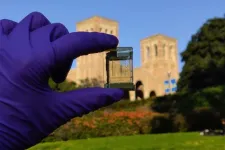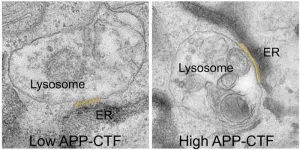(Press-News.org) DALLAS (SMU) – The challenge is to connect the dots for high school students between the technology in their cell phones and the career options manufacturing the devices. To that end, the National Science Foundation (NSF) has awarded an Innovative Technology Experiences for Students and Teachers (ITEST) grant to SMU professor Lin Lipsmeyer and colleagues toward developing one of the first game-based semiconductor curricula for high school students.
The online game-based semiconductor curriculum will be made available to a wide range of students through a collaboration with Dallas-based gaming company Stimuli. Additional partners include Prabuddha Chakraborty at the University of Maine and Xiaoli Yang at Fairfield University. In addition to the game-based curriculum, the team will organize workshops, summer camps, and industry field trips for students.
These efforts aim to help high school students develop skills and career interests in semiconductor fields. The semiconductor curriculum will be designed and improved iteratively based on student’s feedback.
“High schoolers are among the most frequent users of electronic devices that require semiconductor chips, but how these devices are designed and manufactured is not commonly taught in schools,” said Lipsmeyer. “We will use this grant to address knowledge gaps and workforce needs equitably and incorporate an AI Educator program to provide additional assistance and insights to students.”
Lipsmeyer is chair of the Department of Teaching and Learning at SMU’s Simmons School of Education and Human Development and is the Simmons School’s liaison to the SMU-led Texoma Semiconductor Tech Hub. One of 31 tech hubs designated across the nation by the Biden administration, its goal is to bring semiconductor manufacturing jobs back to the North Texas/southern Oklahoma region over the next decade, and education will play a significant role in growing a technical workforce.
The grant to Lipsmeyer and partners is for 1.3 million for a period of four years. The NSF’s ITEST program is an applied research and development program that seeks to actualize a diverse future STEM (science, technology, engineering, and mathematics) and ICT (information and communication technologies) workforce that is prepared to meet pressing local, societal, and global challenges.
Any opinions, findings, conclusions, or recommendations expressed in this material are those of the authors and do not necessarily reflect the views of the National Science Foundation.
About SMU
SMU is the nationally ranked global research university in the dynamic city of Dallas. SMU’s alumni, faculty and more than 12,000 students in eight degree-granting schools demonstrate an entrepreneurial spirit as they lead change in their professions, communities and the world.
END
SMU prof to use NSF grant to develop game-based semiconductor curriculum for high school students
Innovative project aims to bridge knowledge gaps and inspire future semiconductor professionals
2024-04-15
ELSE PRESS RELEASES FROM THIS DATE:
Advance in light-based computing shows capabilities for future smart cameras
2024-04-15
Researchers developing the next generation of computing technology aim to bring some light to the field — literally.
Optical computing, which relies on particles of light called photons, is expected to provide alternatives to traditional electronic approaches. Such systems — or light-based components of hybrid systems that also retain electronic parts — could be faster, consume less energy and compute visual information more efficiently through simultaneous, parallel processing.
To date, ...
Q&A: How claims of anti-Christian bias can serve as racial dog whistles
2024-04-15
In a speech to a group of religious broadcasters in February, Donald Trump promised to create a task force to counter “anti-Christian bias,” which he said would investigate the “discrimination, harassment and persecution against Christians in America.”
It’s not the first time Trump has claimed that Christians are being persecuted, and he’s not alone. As more politicians repeat these statements, researchers from the University of Washington investigated whether anti-Christian bias claims can also be ...
Three advances in pavement technology — for safer, more sustainable roadways
2024-04-15
While April showers bring May flowers, these months also kick off road construction season — when cracks and potholes that developed over the winter get fixed. But recent advances could make future roadways safer and repairs more sustainable, thanks to smart pothole monitoring, snail shells and graphene. The new approaches can be found in three papers recently published in ACS journals. Reporters can request free access to these papers by emailing newsroom@acs.org.
A smart pothole monitoring system for cars. By harnessing the vibrations that shake a vehicle as it drives over uneven pavement, researchers have created a system that ...
Civil engineer looks to remedy inequities in traffic safety
2024-04-15
Alyssa Ryan, an assistant professor of civil and architectural engineering and mechanics, in the University of Arizona College of Engineering, is leading a national study to identify disparities in traffic safety for all transportation users, including drivers, bicyclists and walkers.
"Transportation engineering is very focused on people and impacting society and how people interact with the world," said Ryan. "If you don't have transportation, you can't do anything."
With a $467,000 ...
New research highlights effects of gentrification on urban wildlife populations across U.S. cities
2024-04-15
Chicago (April 15, 2024) – New research published on Monday, April 15 in the Proceedings of the National Academy of Sciences of the United States of America (PNAS) identifies how gentrified parts of a city have notably more urban wildlife than ungentrified parts of the same city, further limiting marginalized communities’ opportunity to connect with nature. The study, led by Lincoln Park Zoo’s Urban Wildlife Institute, analyzed data from 23 cities across the continental U.S., collected by partners of the Urban Wildlife Information Network ...
Vaccine breakthrough means no more chasing strains
2024-04-15
Scientists at UC Riverside have demonstrated a new, RNA-based vaccine strategy that is effective against any strain of a virus and can be used safely even by babies or the immunocompromised.
Every year, researchers try to predict the four influenza strains that are most likely to be prevalent during the upcoming flu season. And every year, people line up to get their updated vaccine, hoping the researchers formulated the shot correctly.
The same is true of COVID vaccines, which have been reformulated to target sub-variants of the most prevalent strains ...
Epilepsy drug prevents brain tumors in mice with NF1
2024-04-15
A drug used to treat children with epilepsy prevents brain tumor formation and growth in two mouse models of neurofibromatosis type 1 (NF1), according to a study by researchers at Washington University School of Medicine in St. Louis. NF1 is a genetic condition that causes tumors to grow on nerves throughout the body, including the optic nerves, which connect the eyes to the brain.
The findings lay the groundwork for a clinical trial to assess whether the drug, lamotrigine, can prevent or delay brain tumors in children with NF1. The study is online in the journal Neuro-Oncology.
“Based on these data, the Neurofibromatosis Clinical Trials Consortium is considering launching a first-of-its-kind ...
Study uses thermodynamics to describe expansion of the Universe
2024-04-15
The idea that the Universe is expanding dates from almost a century ago. It was first put forward by Belgian cosmologist Georges Lemaître (1894-1966) in 1927 and confirmed observationally by American astronomer Edwin Hubble (1889-1953) two years later. Hubble observed that the redshift in the electromagnetic spectrum of the light received from celestial objects was directly proportional to their distance from Earth, which meant that bodies farther away from Earth were moving away faster and the universe must be expanding.
A surprising new ingredient was added to the model in 1998 when observations of ...
New mechanism uncovered in early stages of Alzheimer's disease
2024-04-15
Leuven (Belgium), 16 April 2024 – Alzheimer's disease (AD) remains one of the most challenging and prevalent neurodegenerative disorders, affecting millions of individuals worldwide. In a new study published in Developmental Cell, researchers from the lab of Wim Annaert (VIB-KU Leuven) have identified a novel mechanism potentially connected to the early stages of AD. They demonstrated that a fragment of the amyloid precursor protein (APP), called APP-CTF, disrupts communication between cellular compartments crucial for calcium storage and waste disposal, which ...
Elite coaches leaving home as Western countries seek sport success
2024-04-15
Nations battling for Olympic success in a global sporting ‘arms race’ has led to elite coaches migrating to Western countries as they bid to escape antiquated and restrictive coaching regimes in their home countries, reveals a new study funded by the International Olympic Committee’s Olympic Studies Centre.
National teams pursuing Olympic gold medals are increasingly recruiting foreign elite coaches from the leading countries, as they try to close the gap between themselves and the top medal-winners in particular ...
LAST 30 PRESS RELEASES:
Novel camel antimicrobial peptides show promise against drug-resistant bacteria
Scientists discover why we know when to stop scratching an itch
A hidden reason inner ear cells die – and what it means for preventing hearing loss
Researchers discover how tuberculosis bacteria use a “stealth” mechanism to evade the immune system
New microscopy technique lets scientists see cells in unprecedented detail and color
Sometimes less is more: Scientists rethink how to pack medicine into tiny delivery capsules
Scientists build low-cost microscope to study living cells in zero gravity
The Biophysical Journal names Denis V. Titov the 2025 Paper of the Year-Early Career Investigator awardee
Scientists show how your body senses cold—and why menthol feels cool
Scientists deliver new molecule for getting DNA into cells
Study reveals insights about brain regions linked to OCD, informing potential treatments
Does ocean saltiness influence El Niño?
2026 Young Investigators: ONR celebrates new talent tackling warfighter challenges
Genetics help explain who gets the ‘telltale tingle’ from music, art and literature
Many Americans misunderstand medical aid in dying laws
Researchers publish landmark infectious disease study in ‘Science’
New NSF award supports innovative role-playing game approach to strengthening research security in academia
Kumar named to ACMA Emerging Leaders Program for 2026
AI language models could transform aquatic environmental risk assessment
New isotope tools reveal hidden pathways reshaping the global nitrogen cycle
Study reveals how antibiotic structure controls removal from water using biochar
Why chronic pain lasts longer in women: Immune cells offer clues
Toxic exposure creates epigenetic disease risk over 20 generations
More time spent on social media linked to steroid use intentions among boys and men
New study suggests a “kick it while it’s down” approach to cancer treatment could improve cure rates
Milken Institute, Ann Theodore Foundation launch new grant to support clinical trial for potential sarcoidosis treatment
New strategies boost effectiveness of CAR-NK therapy against cancer
Study: Adolescent cannabis use linked to doubling risk of psychotic and bipolar disorders
Invisible harms: drug-related deaths spike after hurricanes and tropical storms
Adolescent cannabis use and risk of psychotic, bipolar, depressive, and anxiety disorders
[Press-News.org] SMU prof to use NSF grant to develop game-based semiconductor curriculum for high school studentsInnovative project aims to bridge knowledge gaps and inspire future semiconductor professionals




